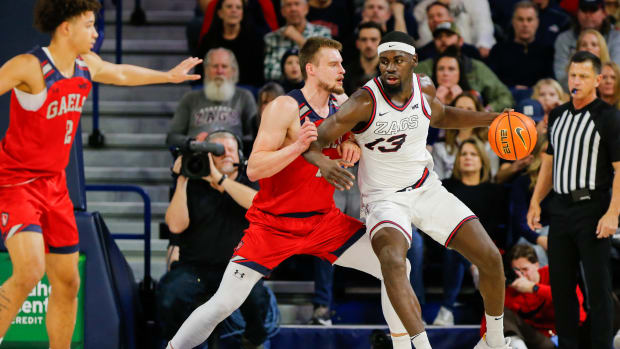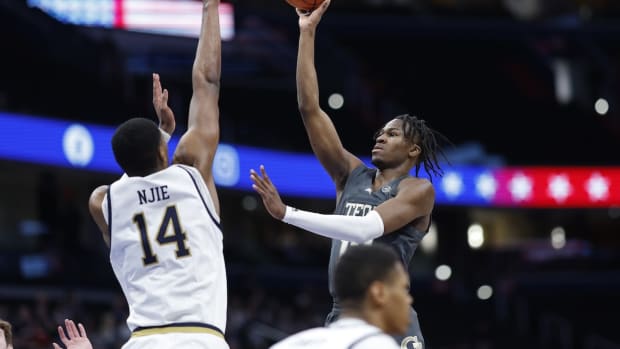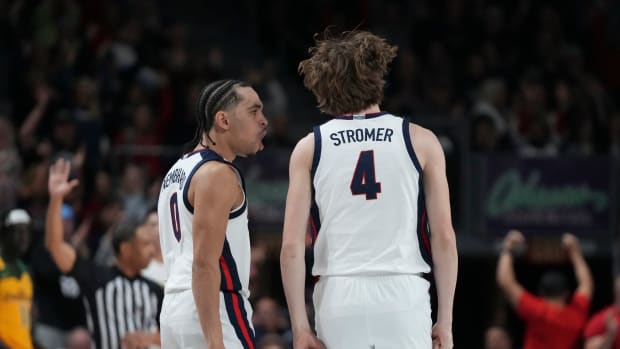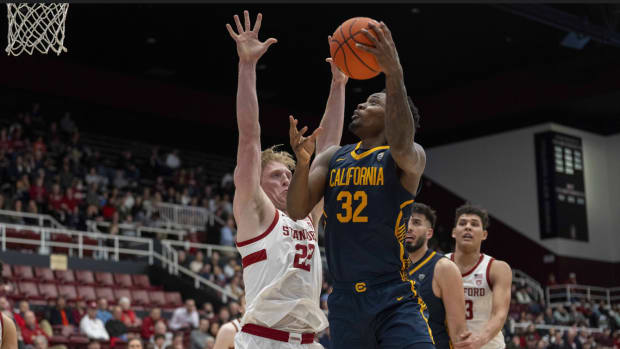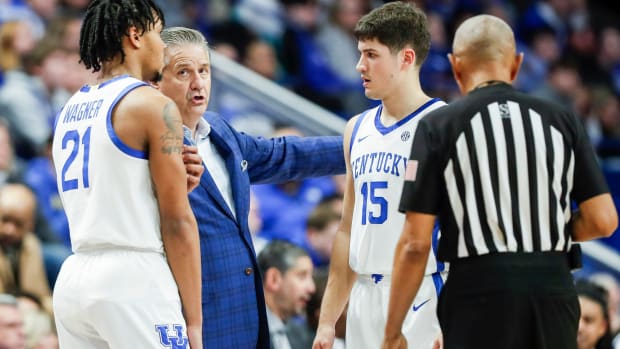Bill Guthridge was a loyal assistant, underrated coach and Carolina icon
Time saps the memory, and so perhaps it shouldn’t be surprising that former North Carolina coach Bill Guthridge had slipped from the ever-shifting American sporting consciousness, especially since even Tar Heels fans had a hard time remembering how good he was while he was still on the sideline. Yes, he was only the head coach at UNC for three seasons, the last of which was 15 years ago. And no, he did not have the résumé, or the innovative mind or the society-shaking impact of his predecessor in Chapel Hill, Dean Smith. But Guthridge, who died Tuesday at 77 of heart failure, was not just one of the best college basketball coaches of all time, he was an unfailingly decent man who displayed a rare degree of loyalty in a profession in which that trait is so often lacking.
His death is another blow in a tough year for the Tar Heels. Smith, the patriarch of the Carolina Family, passed away from dementia at 83 in February. Now, barely three months later, the man who was the family uncle as Smith’s loyal aide for 30 years has also gone. For three decades those two men were the pillars of Carolina’s basketball program, building it into the sport’s preeminent empire. When Smith, then the game’s all-time winningest coach, retired in 1997, Guthridge took over and guided the Tar Heels to two Final Fours in three years himself before quietly stepping aside.
Guthridge’s impact at Chapel Hill had always been quiet, and it went on long before he became the head coach. He was the Tar Heels’ shooting coach, and it isn’t a coincidence that UNC at one point shot better than 50% from the floor for 18 consecutive seasons with Guthridge on the sidelines. He was also the big man coach, and it is wonderfully ironic to note that stars from Mitch Kupchak to Sam Perkins to Brad Daugherty to Eric Montross to Rasheed Wallace to Brendan Haywood owe at least some of their success to a man who didn’t top six feet tall.
Former UNC coach Bill Guthridge, longtime Dean Smith assistant, dies
Given those credentials and the fact that he had the same courteous manner and humble attitude as his better-known boss, it would have seemed that the decision to have Guthridge replace Smith in October 1997 would be met with universal acclaim in Tar Heel Nation. And in some ways it was, especially because it would have been hard for any coach, even a rookie, to screw up the ’97-98 Heels. But Guthridge, who was 60 when he took over, was always seen as a glorified interim head coach, a reality that undoubtedly harmed North Carolina on the recruiting trail and left fans as interested in who his replacement would be in the future as they were in the job he was doing in the present.
It was a job Guthridge did historically well. His first team went 34-4, won the ACC tournament title and reached the Final Four. His second team, minus Wooden Award winner Antawn Jamison, All-America Vince Carter and star shooting guard Shammond Williams, still managed to go 24-10. And his third team also went to the Final Four, making him the only coach ever to take two of his first three teams that far.
But Guthridge was hardly immune from criticism. He chose to use a rotating six-man starting rotation in ’98, which meant that even Jamison and Carter didn’t start every game. His ’99 squad suffered three double-digit losses to Duke and endured what is still the only first-round NCAA tournament loss by a UNC team since 1978. And the 2000 team finished 22-14 and was fortunate just to get an NCAA tournament bid after playing .500 ball for the last three months of the regular season.
Guthridge was blamed for everything from his recruiting (Carolina had only one McDonald’s All-American, guard Joe Forte, in his last two classes) to his sideline behavior (his placid, demeanor was so bothersome to fans that they gave Matt Doherty, his successor, a standing ovation when he got a technical in his first game on the UNC bench) to, ridiculously, his wardrobe (his suits were considered not fancy enough for a man in his position).
His only real crime, of course, was one he could do nothing about. He wasn’t Dean Smith.
*****
For years, there would inevitably come a time during every North Carolina game in which television cameras would catch Smith and Guthridge talking and the announcers would make sure to mention how many years the two had been together, making them seem like the old married couple of college basketball. Then the attention would return to the game, and to Smith, and Guthridge would recede into the background again, chewing on ice the entire time.
Trying to figure out what would make someone spend 30 years as a No. 2 might be one of the most mind-bending mathematical queries in sports history. It seems so odd as to be nonsensical. Some of it surely had to do with their similar personalities and their shared backgrounds as Kansans (Smith had even dated Guthridge’s sister). But Guthridge was so loyal to the Tar Heels program that he didn’t even interview for any head coaching jobs after 1978, when he had accepted the post at Penn State, only to turn around en route to his introductory press conference and return to Chapel Hill. He remained by Smith’s side for another 19 seasons.
Such longevity is almost impossible to come by, even for head coaches. Consider the triumvirate of Tobacco Road coaches who were in place when Guthride retired in the summer of 2000. Doherty lasted just three years before being forced to resign with a 53-43 record. Herb Sendek took N.C. State to five straight NCAA tournaments before being run out of town; he wound up at Arizona State and was fired in March after reaching just two NCAA tournaments in nine seasons. And while Mike Krzyzewski is still winning championships at Duke, among his three assistants that summer were two—Chris Collins and Steve Wojciechowski—who might have seemed like they were in Durham for 30 years before becoming head coaches at Northwestern and Marquette, respectively, but in fact were there fewer years combined (28) than Guthridge spent under Smith in Chapel Hill.
Even successful head coaches don’t often last, and this summer has been another reminder of that. The man who defeated Guthridge in his final game as coach, Billy Donovan, just left Florida to become the coach of the NBA’s Oklahoma City Thunder, having publicly admitted that he didn’t know if he could or would want to be defined by staying at one place in the way that Smith, Krzyzewski and yes, Guthridge, have been.
SI Vault: Bill Guthridge's retirement at North Carolina set off a chain reaction
When Guthridge chose to leave in 2000, he was again a secondary storyline, just as he had been upon taking the job three years prior. The assumption, which was erroneously reported by multiple media outlets, was that Roy Williams would leave Kansas and return to his alma mater to coach the Tar Heels. But after a week of soul-searching, Williams decided to stay. And when UNC athletic director Dick Baddour all but told 76ers coach Larry Brown not to bother and Bucks coach George Karl wasn’t allowed to come, suddenly the vaunted Carolina Coaching Tree was looking a little withered.
Ultimately the job went to Doherty, but when UNC nosedived to a school-worst 8-20 season in 2001-02, there was plenty of blame to go around, and some of it fell on Guthridge, who had been unable to keep the Carolina cupboard appropriately stocked with blue chip talent while he was there and was chastised for leaving at an inopportune time in the summer recruiting schedule. After another forgettable season in 2003, Doherty was forced to resign.
Keeping things in the family, Guthridge never said anything in his defense, never blamed Doherty for firing his three assistants—former Tar Heel players all—upon taking the job and never expressed displeasure with Williams for leaving Carolina in the lurch. But when Williams finally returned home in 2003, among the first members of the welcoming party at the Chapel Hill airport was Bill Guthridge.
*****
If Smith became a ghost around Chapel Hill after his retirement, Guthridge was only slightly more visible. As a senior at UNC, I saw him in November 2001 at the Tar Heels’ shocking season-opening loss to Hampton, a harbinger of the disastrous campaign that lay ahead, sitting on the second-level of the Smith Center, but otherwise he was hard to find in the building on game day.
Not that he was forgotten there. A banner with his name on it was hung from the rafters, and Williams named the Tar Heels locker room after him. And at Smith’s public memorial at the Dean Dome in February, there was Guthridge at the far end of the front row in his wheelchair.
At the end of the ceremony, several former Tar Heel players went looking for Guthridge. When they were in school, their greeting of “Coach” would undoubtedly be met with the response “Player.” There was little chance to share such memories on that day, as Guthridge was already in declining health.
The Longest Goodbye: Friends, family mourned Dean Smith before his death
I was there too, and I saw him from afar, though I didn’t dare speak to him. I did think, though, of a conversation we’d had many years before. It came in late August 2001, when I was at the Jimmy V Celebrity Golf Classic in Cary, N.C., for the (Durham) Herald-Sun. The day was devoted to the memory of late N.C. State coach Jim Valvano. As might be expected, Prestonwood Country Club was littered with Tobacco Road legends. Lorenzo Charles, whose dunk won the 1983 NCAA title for the Wolfpack, was there. Elton Brand, just two years removed from winning the Wooden Award at Duke, was there. And all three head coaches in the Triangle—Krzyzewski, Doherty and Sendek—were there, too.
At one point I looked over at the veranda and saw another legend, standing by himself in the late afternoon sunshine. And so I walked over and introduced myself to Guthridge. We chatted briefly about Valvano and about the day and about golf. His foursome had won the competition on the Fairways Course. He told me about how hoped to get his handicap back into single digits now that he was retired. After I put my notebook away he asked about me. I told him I was just starting my senior year at UNC, and would be graduating in a few months and then looking for a job.
“You know,” he said, “I’d be happy to write a letter of recommendation for you if you want.”
I was stunned. I barely knew the man, and he surely didn’t know me. I’d been a face in the crowd at some of his press conferences while he was coaching, but I couldn’t then and still can’t recall ever having had a one-on-one conversation with him before that day. I mumbled a quick thank you and soon left him alone.
I didn't take him up on his offer, but I never doubted his sincerity. I never spoke to Bill Guthridge again. But time will never take that memory.



